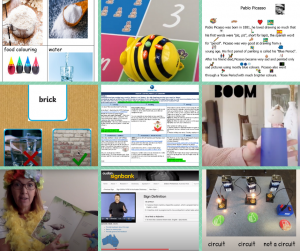The COVID-19 pandemic brought big changes to schools and education deliverers world-wide, and it was no exception for the Mater Dei community of students and Young Adults with an intellectual disability, who together with staff, quickly and energetically adapted to new ways of teaching, learning and supporting one another.
Mater Dei, located in Camden on Sydney’s southern outskirts, is a member of Good Samaritan Education.

It consists of the Mater Dei School, a K-12 school for students with intellectual disability; NextPath Continuous Learning, a post-school program for young adults which empowers and supports them to achieve personal and career goals; NextPath Assessment and Therapy, which provides allied health services, including occupational therapy, speech therapy and physiotherapy; and Mater Dei Early Childhood Education, which offers pre-school for children with and without any level of additional needs, as well as playgroups and early intervention programs.
Mater Dei School Assistant Principal, Eryn Lonergan said that during the COVID-19 outbreak and subsequent partial school shutdown, the school’s staff and executive showed “remarkable flexibility and adaptability” amid the ever-changing health recommendations.
“COVID-19 saw schooling as we know it temporarily cease to exist,” she said.
“Significant changes and interruptions were experienced world-wide, causing us all to come to terms with a new routine and a new kind of normal.

“For students with intellectual disability, these changes were amplified because they could no longer rely on the routine of school and the in-person support of Mater Dei staff.”
Eryn said staff took on the unprecedented challenge of delivering quality learning remotely to their students.
They participated in intensive professional development sessions to upskill themselves to effectively carry over their research and evidence-based teaching for students with intellectual disability into an online format.
The school also drastically accelerated the school-wide implementation of the Compass school and student management system where the online learning modules would be uploaded for students.
“They did this wholeheartedly and really got creative in developing engaging online lessons and material,” Eryn said.
Some of the creative online lessons included investigating eco-systems in the students’ own backyard; chemistry lessons set in the home kitchen; hands-on craft lessons; dancing and movement for personal development, health and physical education (PDHPE) lessons; cooking; and even practising freestyle swimming technique from the comfort of the student’s loungeroom.
The Young Adults participating in Mater Dei’s NextPath Continuous Learning program and their goal facilitators also had to adapt quickly to online learning.
“Our aim remained consistent in building independence, self-capacity and engaging our Young Adults in the online space,” said one of NextPath’s goal facilitators, Lauren Casuscelli.
“Our online platform of learning was up and running in two weeks using Google Classroom and Google Hangouts.
“Our staff ran group sessions twice a day through this platform and continued to work closely with our young adults on achieving their goals.”
Staff also created and sent out individualised activity packs and stayed in touch through phone calls to families and one-on-one sessions, which reflected their one-on-one programs onsite.
A large focus of the online program was keeping the Young Adults engaged in a positive activity each day and keeping their mind and body healthy while still working towards their individual goals.
Lauren said that despite the challenges there were many positives to take from the COVID-19 experience.
“We hope to take the teachings we have learned and discovered during our online period and apply them to what NextPath can offer in the future,” she said.
NextPath Assessment and Therapy also took many positives from their experience of transitioning to Telehealth sessions, conducted by video conferencing or phone during the pandemic, saying a major upside was the increased engagement and communication with parents and being able to work more collaboratively with them.
July 2020.
